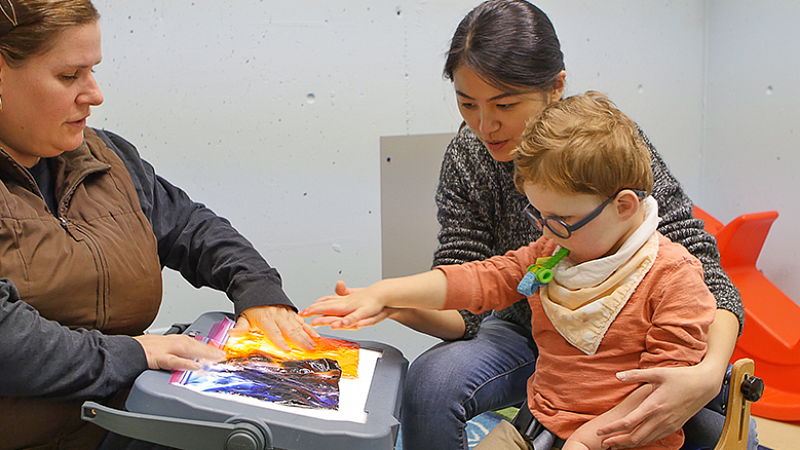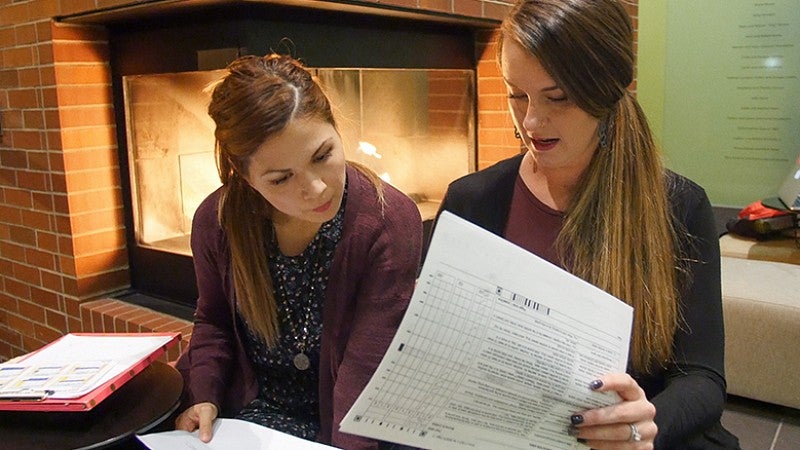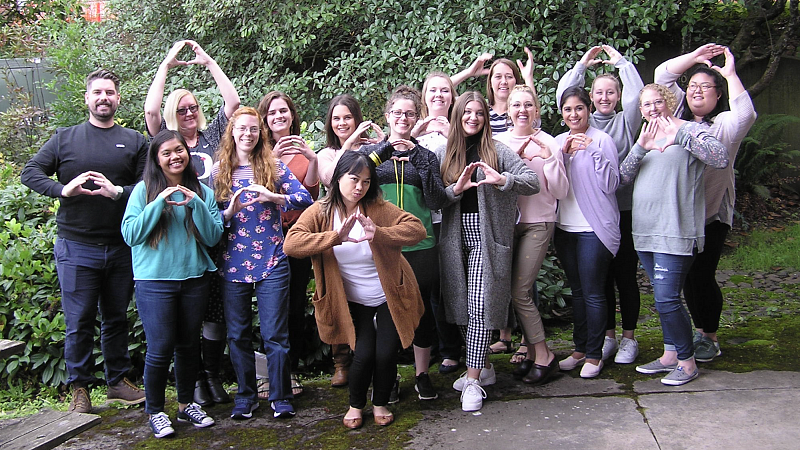Distance Learning | Tuition Support | Optional Project VOICE Application | Coursework | Licensure | Program Requirements | Apply
Early Intervention/Early Childhood Special Education Master’s and Licensure
Our licensure program prepares professionals to help children birth through 5 years with disabilities to succeed. Students learn to provide high quality services to young children with special needs with a focus on inclusive practices and family-guided intervention.
The Early Intervention major leads to a master's degree in Special Education with an emphasis in Early Intervention/Early Childhood Special Education (EI/ECSE).
Information Session
Didn’t get a chance to attend our last info session? That’s okay, we’ve got you covered! Watch the recorded information session from January 2026 to learn more about our program and admissions.
Clicking on the buttons below will open a new window where you can view the information. Use your browser's back button to return to this page.
Tuition Calculator:
Take me to the tuition calculator
Questions may be directed to sped@uoregon.edu.
Why get your Master’s+License in EI/ECSE?
- Nearly 100 percent job placement rate
- The ability to live and work almost anywhere
- Oregon preliminary teaching license
- A strong lifelong network with cohort peers
Graduates of the program are prepared to fill a variety of professional roles:
- EI/ECSE specialist
- EI/ECSE service coordinator
- Home visitor
- Parenting coach
- Classroom teacher
- Early childhood consultant
- Evaluation specialist
- Research assistant
At a Glance:
- Cohort size = 15-25 students
- Can be completed in 1 or 2 years
Distance Learning Option
Our distance masters/licensure program is ideal for early childhood educators, paraprofessionals, or educational assistants in EI/ECSE that work in Oregon.


"After being in the SPED EI/ECSE Distance program for the last two semesters, it’s become apparent that the professors and students are very passionate about creating an environment that values challenges and sees them as a way to adapt and grow."
--Kacie Waddell, EI/ECSE Student
Our faculty has a long history of innovation and cutting-edge research that has served to shape and continues to impact the field of EI/ECSE. Carefully sequenced coursework and hands-on practicum experiences provide students with a rich learning experience focused on effective strategies for supporting infants, toddlers, and preschoolers with disabilities in home, school, and community settings.
Research/Outreach Projects
Early Intervention research, demonstration, and outreach programs expand and improve educational and therapeutic services for infants and young children who are at risk or disabled, and their families.
Areas of research & technical assistance
- Developing and conducting research on screening instruments and systems for early identification of developmental delays in young children
- Evaluating effectiveness of learning environments for young children and teachers
- Developing and conducting research on curriculum-based assessments for infants, toddlers, and preschool children
- Supporting development of linked systems for early intervention/early childhood special education service delivery
- Investigating effectiveness of early childhood mental health approaches
- Providing technical support and professional development for early childhood, early intervention, and related service personnel
Positive approaches and evidence-based strategies are the core of our curriculum:
- Linked System: Assess child development, create goals, design and provide intervention, monitor child progress to evaluate results and modify intervention as needed.
- Activity-based Intervention: Children learn in routine, planned, and child-initiated activities.
- Assessment and Evaluation: Developmental screening and evaluation for EI/ECSE eligibility.
- Culturally Responsive Practices: Approaches that meet the needs of all young children with or at-risk for disabilities and their families.
- Coaching and Consultation: Guide parents and teachers to facilitate successful early learning in diverse contexts.
- Teaming and Collaboration: Work effectively within an interdisciplinary team approach.

Relationships matter
We know that young children learn when they are in relationship with others, and we believe this is true for students too. This belief in the promotion of positive relationships and inspiring interactions with others is at the core of our program. Our students build close relationships with peers, faculty, practicum and community leaders.

You can make a bigger difference
Well-trained professionals in EI/ECSE are in high demand:
- Tuition support may be available through grants from the US Department of Education
- Opportunity for licensed teachers to expand their reach with our added-endorsement option
Early Intervention Endorsements
Tuition Support
Virtual Two-Year EI/ECSE Master’s Program
Tuition support may be available for EI/ECSE master’s students who are employed in the EI/ECSE field outside of Lane County. Students who have the support of their employer to complete the part-time virtual EI/ECSE master’s licensure program are encouraged to apply.
For more information, please contact sped@uoregon.edu.
Optional Project VOICE Application
Project VOICE (Valuing Opportunities for Interdisciplinary Collaboration in Early communication) is a federally funded Personnel Development Grant from the Office of Special Education Programs (H325K250120: PI Shire, Co-I Kunze, and Patricelli).
Project VOICE is designed to provide master’s students with specialized interdisciplinary training to support young children with autism and their families in early intervention and early childhood special education settings. Two master's students will be accepted from the 2026-2028 cohort. These scholars will be a part of an interdisciplinary cohort engaging in specialized learning opportunities while being provided with tuition coverage during the academic year for two years (with the exception of summer), associated fees and a monthly stipend of $1800 during the academic year (Fall/Winter/Spring).
Please note that all application materials are due by the February 13, 2026 deadline.
Coursework is directly linked to practicum and student teaching experiences in community-based settings
Students in the EI/ECSE program have the option to complete the requirements for the master’s degree and licensure program in 1 or 2 years. All aspects of the master’s degree and Oregon teacher licensure requirements are embedded in the program.
Clicking on the buttons below will download a copy of that file to your computer/device.
About Licensure
The preliminary teaching license is granted by the Oregon Teacher Standards and Practices Commission and is required for EI/ECSE specialists serving children birth to five years of age in public school programs in Oregon, including Education Service Districts.
In addition to successful completion of course and fieldwork requirements for the master’s degree, licensure candidates must also:
- Complete full-time student teaching
- Successfully complete an additional Teaching Sample
- Pass PRAXIS II test for Special Education: Preschool/Early Childhood
Program Requirements
The master’s degree program conforms to the established University of Oregon and College of Education requirements and procedures:
- Minimum of 45 credits in courses approved for graduate credit taken as an admitted master’s degree student (51 credits minimum if doing a specialization area)
- Up to 15 credits may be officially transferred in through a petition process
- 24 credits must be in UO graded courses passed with a GPA of 3.0 or better
- At least 9 credits in 600-level courses must be taken in residence
- Minimum 30 credits in SPED courses
All credits for the degree (including transfer credits) must be completed within seven years.
EI/ECSE Master’s Degree + Licensure Program Plan
Sample Course Schedule
Summer Term - 10 Credits
course and Title | CREDITS |
|---|---|
SPED 511 Foundations of Disability I (online) | 3 |
4 | |
3 |
Fall Term - 14 Credits
course and Title | CREDITS |
|---|---|
4 | |
3 | |
SPED 691 Professional Practices I | 1 |
SPED 680 Foundations in Early Childhood and Early Intervention | 3 |
SPED 691 Practicum in EI I | 3 |
Winter Term - 16 Credits
course and Title | CREDITS |
|---|---|
3 | |
3 | |
SPED 692 Professional Practices II | 1 |
3 | |
SPED 612 Practicum II | 3 |
SPED 528 Law and Special Education (online) (also offered in summer) | 3 |
SPED 686 Autism in Early Intervention (optional) | (3) |
Spring Term - 16 Credits
course and Title | CREDITS |
|---|---|
3 | |
SPED 693 Professional Practices III | 1 |
SPED 683 Curriculum in Early Childhood Education and Early Intervention | 3 |
9 |
